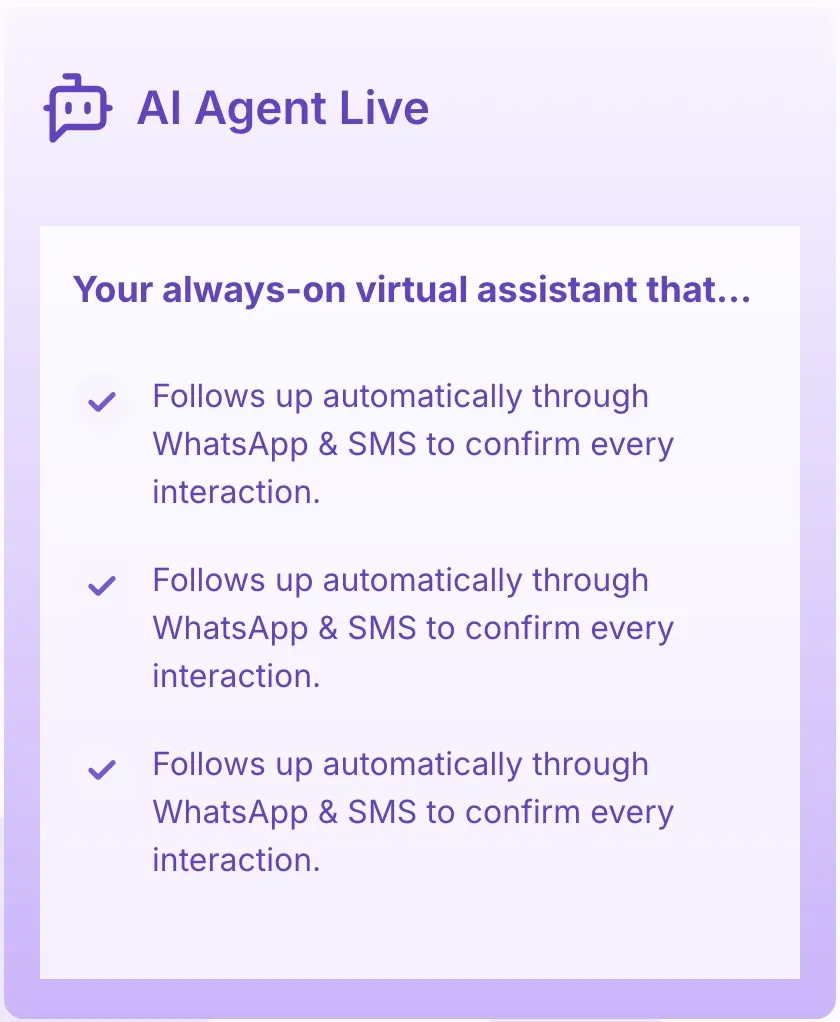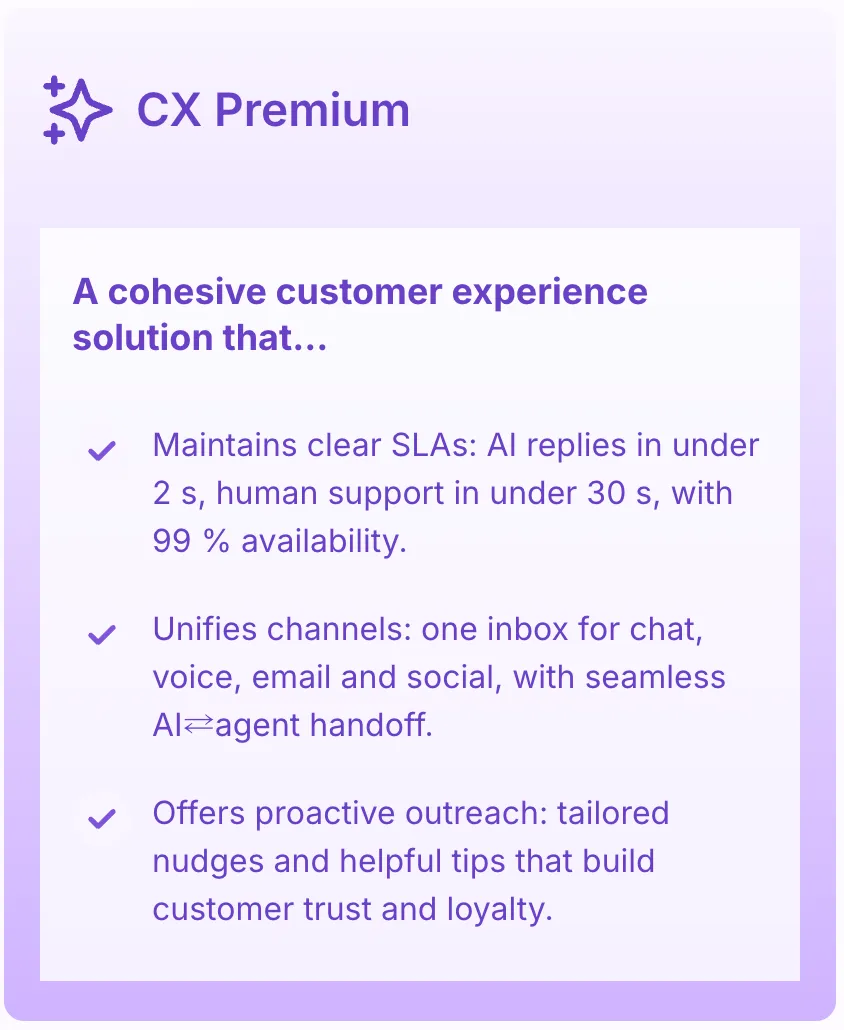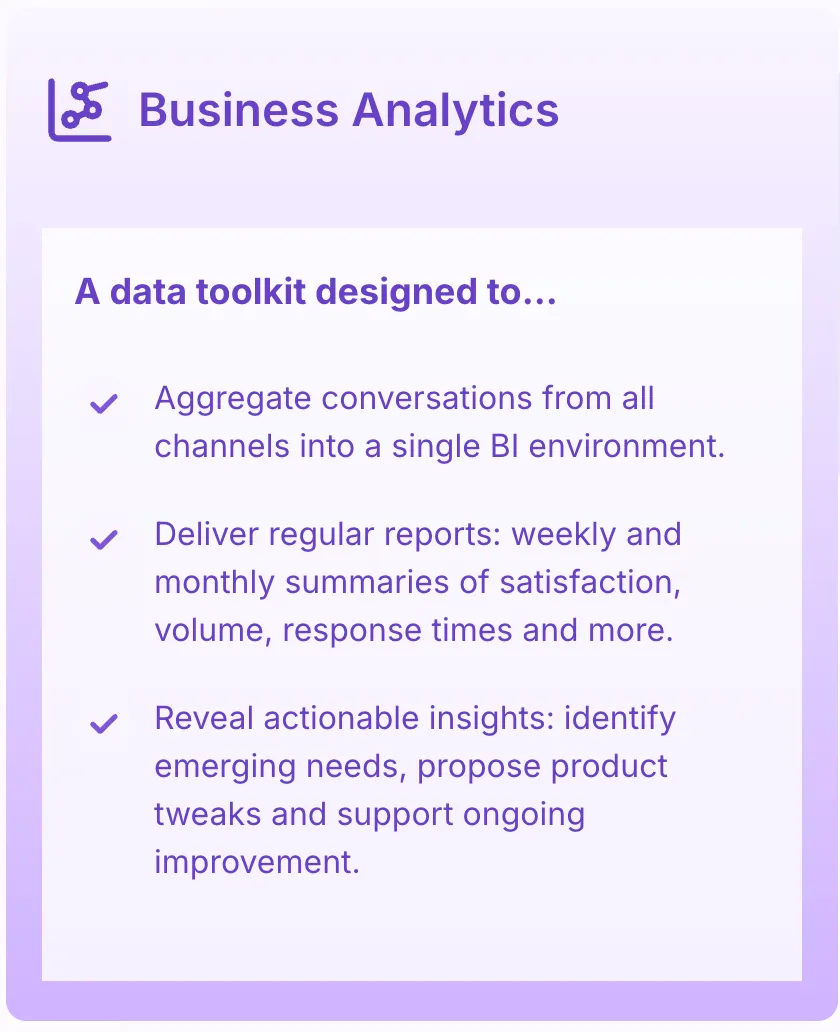Emotional intelligence - the ability to recognize, understand, and manage emotions - is critical in delivering outstanding customer service. It enables support teams to:
- Read customer sentiment accurately
- Respond with appropriate empathy
- Build meaningful connections
- De-escalate tense situations
- Create positive emotional experiences
The integration of AI technology in customer service has introduced powerful capabilities for handling routine inquiries and processing large volumes of interactions. When combined with emotional intelligence principles, AI systems can deliver personalized, empathetic responses at scale.
This powerful combination of emotional intelligence and AI technology promises to revolutionize customer service by creating more meaningful interactions, reducing customer effort, and driving better business outcomes through enhanced customer satisfaction and loyalty.

Understanding Emotional Intelligence in Customer Service
Emotional intelligence in customer service encompasses specific components that drive successful customer interactions:
1. Self-awareness
- Recognition of personal emotional triggers during challenging conversations
- Understanding how tone and language impact customer responses
- Ability to maintain composure under pressure
2. Empathy
- Active listening to identify underlying customer concerns
- Reading between the lines of customer feedback
- Adapting communication style to match customer needs
3. Emotional Regulation
- De-escalation techniques for heated situations
- Balanced responses to negative feedback
- Professional boundaries maintenance
Real-time emotional tracking through AI-powered systems enables support teams to gauge customer sentiment throughout interactions. These systems analyze:
- Voice pitch variations
- Speech patterns
- Word choice
- Response timing
- Conversation flow
Modern conversational intelligence chatbots integrate these emotional insights to create dynamic support experiences:
- Sentiment Analysis: AI algorithms detect frustration, satisfaction, or confusion in customer messages
- Adaptive Responses: Chatbots adjust their tone and approach based on detected emotions
- Escalation Triggers: Systems recognize when human intervention is needed for emotional situations
Voice recognition AI enhances emotional detection through:
- Pitch analysis for stress indicators
- Speaking rate monitoring
- Volume level tracking
- Silence pattern identification
These technological capabilities allow support teams to provide emotionally attuned responses that address both the practical and emotional needs of customers, creating a more satisfying service experience.

The Role of AI Technologies Enhancing Emotional Intelligence
AI technologies have transformed customer service by introducing advanced tools that enhance emotional intelligence abilities. These innovations enable deeper, more meaningful customer interactions through improved understanding and response mechanisms.
Generative AI: Creating Human-Like Conversations
Generative AI transforms customer interactions by producing contextually relevant, emotionally attuned responses. This technology:
- Adapts conversation tone based on customer sentiment
- Creates personalized responses drawing from past interactions
- Maintains consistent emotional engagement throughout the conversation
- Learns from successful customer interactions to improve future responses
Agentic AI: Managing Customer Emotional Journeys
Agentic AI acts as an autonomous system that guides customers through their service journey while maintaining emotional awareness:
- Anticipates customer needs based on behavioral patterns
- Adjusts support strategies in real-time
- Manages complex multi-step resolutions
- Maintains emotional context across different interaction points
Multi-Modal AI: Comprehensive Emotional Analysis
Multi-modal AI systems process multiple channels of communication simultaneously to build a complete picture of customer emotions:
Voice Analysis
- Detects stress levels through pitch variations
- Identifies urgency through speech patterns
- Recognizes emotional changes in real-time
Facial Expression Recognition
- Captures micro-expressions during video interactions
- Measures customer engagement levels
- Identifies signs of frustration or satisfaction
Text Analysis
- Evaluates sentiment in written communications
- Identifies emotional triggers in customer messages
- Analyzes word choice and language patterns
These AI technologies work together to create a synchronized support system that understands and responds to customer emotions with unprecedented accuracy. The combination of these tools enables support teams to deliver personalized, emotionally intelligent interactions at scale.
Measuring the Impact of Emotional Intelligence on Customer Service Metrics
Emotionally intelligent customer service creates measurable improvements across key performance indicators. Data shows that companies implementing AI-powered emotional intelligence solutions achieve up to 40% reduction in Customer Effort Score (CES), signaling smoother, less frustrating interactions for users.
Key Performance Improvements:
- First Contact Resolution (FCR) rates increase by 25-30%
- Customer Satisfaction (CSAT) scores rise by an average of 35%
- Support ticket volumes decrease by 20-25%
Predictive issue detection powered by emotional intelligence transforms reactive support into proactive assistance. AI systems analyze patterns in customer behavior, tone, and historical data to identify potential problems before they escalate. This early intervention approach leads to:
- Reduced customer frustration
- Lower support costs
- Higher satisfaction ratings
- Improved brand loyalty
Real-time emotional attunement enables support teams to adapt their responses based on the customer's emotional state. When AI detects rising frustration or confusion, it can:
- Adjust communication style
- Escalate to human agents
- Offer alternative solutions
- Provide additional resources
The combination of predictive capabilities and emotional awareness creates a support experience that anticipates and addresses customer needs. Companies using these systems report significant improvements in resolution speed and customer effort reduction.
Support teams can track emotional shifts throughout customer interactions using AI-powered analytics dashboards. These insights help identify common pain points, optimize response strategies, and train both AI systems and human agents for better emotional intelligence.

Integrating Emotional Intelligence into an AI-Powered Customer Service Ecosystem
Building emotionally intelligent AI systems requires seamless integration with your existing customer relationship management (CRM) infrastructure. When AI has access to comprehensive customer data, it creates personalized responses that reflect each customer's unique history and preferences.
CRM Integration Benefits:
- Real-time access to purchase history
- Previous interaction context
- Customer preferences and pain points
- Behavioral patterns across touchpoints
- Satisfaction scores and feedback history
Your AI system uses this rich contextual data to craft responses that demonstrate genuine understanding and empathy. A customer who has recently experienced delivery delays receives different treatment than a first-time buyer exploring your products.
Maintaining Emotional Continuity Across Channels
Modern customers switch between multiple communication channels during their support journey. A unified omnichannel approach preserves emotional context as customers move between:
- Live chat interactions
- Phone conversations
- Email exchanges
- Social media messages
- SMS communications
Your AI system tracks emotional signals across these touchpoints to maintain consistent emotional awareness. A frustrated customer who started on Twitter and switched to phone support receives seamless emotional acknowledgment of their situation.
The integration of emotional intelligence across channels creates a support ecosystem that remembers past interactions, anticipates needs, and responds with appropriate emotional context. This connected approach helps you deliver personalized support that builds lasting customer relationships through every interaction.
Your support team gains a complete view of each customer's emotional journey, enabling them to provide contextually relevant responses that demonstrate true understanding and build trust.
Human-AI Collaboration: Elevating Emotional Intelligence in Support Teams
The evolution of customer service teams brings a transformative shift in human agent roles. AI assistance enables support representatives to become strategic relationship managers, focusing on complex problem-solving and high-value customer interactions.
How Modern Support Teams Use AI Tools
Modern support teams leverage AI tools to:
- Generate real-time conversation summaries
- Predict customer needs before they arise
- Surface relevant content during interactions
- Provide personalized response suggestions
This AI augmentation allows human agents to dedicate their emotional intelligence to building deeper customer relationships. Support representatives now spend less time on repetitive tasks and more time understanding customer contexts, business challenges, and long-term needs.
The Benefits of Combining Human Creativity and Machine Precision
The combination of human creativity and machine precision creates exceptional customer experiences. AI handles routine inquiries while agents focus on:
- Building rapport with key accounts
- Identifying upsell opportunities
- Resolving complex emotional situations
- Developing proactive support strategies
This strategic partnership between humans and AI maximizes the strengths of both - AI's efficiency and scalability paired with human empathy and relationship-building skills.
Strategies for Implementing Emotionally Intelligent AI Solutions Effectively
A successful implementation of emotionally intelligent AI requires a structured approach focused on measurable CX outcomes. Here's a proven roadmap for CX teams:
1. Build Cross-Functional Alignment
- Create dedicated teams combining CX, IT, and Finance expertise
- Define clear success metrics and ROI expectations
- Establish governance frameworks for AI deployment
2. Start with High-Impact Use Cases
- Identify customer pain points with significant emotional components
- Select channels with highest emotional engagement potential
- Deploy AI agents strategically across priority touchpoints
3. Data Integration & Backend Automation
- Connect CRM systems for contextual customer insights
- Automate data capture for new interactions
- Establish real-time product update feeds
4. Fine-Tune Through Real-World Testing
- Gather conversation data from live customer interactions
- Analyze emotional patterns and response effectiveness
- Adjust AI models based on customer feedback
5. Scale Horizontally
- Expand successful use cases to additional channels
- Integrate emotional intelligence capabilities across the support ecosystem
- Monitor and optimize performance metrics continuously
Future Outlook: Emotional Intelligence as a Differentiator in Customer Service by 2025 and Beyond
The customer service landscape of 2025 presents a dramatic shift in expectations. Research indicates that 60% of customer service interactions will be handled by generative AI agents - a significant leap from less than 5% in 2022. This transformation demands a new level of sophistication in automated interactions.
Successful brands will differentiate themselves through AI systems that display:
- Predictable accuracy in understanding and responding to complex emotional needs
- Real-time contextual awareness across multiple touchpoints
- Authentic emotional attunement that builds genuine connections
The trust factor in automated interactions will become paramount. Customers will expect AI systems to:
- Maintain conversation history seamlessly across channels
- Detect and respond to emotional nuances instantly
- Provide personalized solutions based on emotional context
Companies that master emotionally intelligent AI will see measurable benefits:
- Reduced customer effort scores by up to 40%
- Higher first-contact resolution rates
- Improved customer satisfaction through proactive support
- Enhanced brand loyalty through meaningful automated interactions
The convergence of advanced AI capabilities with emotional intelligence will redefine the standard for exceptional customer service, making it a critical competitive advantage in the years ahead.
Conclusion
The combination of emotional intelligence and AI technology is a game-changer for customer service. It's not just about improving numbers anymore - it's about completely transforming the support experience.
By adopting emotionally intelligent AI solutions, organizations can:
- Connect with customers on a deeper level through personalized interactions
- Make it easier for customers to get their issues resolved and increase the number of problems solved in one go
- Empower agents and make their jobs more satisfying
- Stay ahead of the competition in a world where automated services are becoming more common
To succeed in customer service in 2025 and beyond, businesses need to find the right balance between technology and human connection. AI can enhance what humans do, but emotional intelligence is what keeps conversations genuine and meaningful.
The way forward is clear: companies must invest in solutions that combine the accuracy of AI with the ability to understand human emotions. This strategic approach will lead to smoother operations and the authentic, compassionate experiences that customers are increasingly looking for.
FAQs (Frequently Asked Questions)
What is emotional intelligence and why is it important in customer service ?
Emotional intelligence refers to the ability to recognize, understand, and manage one's own emotions as well as those of others. In customer service, it is crucial because it enables support teams to respond empathetically, regulate emotional shifts during interactions, and ultimately enhance customer satisfaction and loyalty.
How does AI technology enhance emotional intelligence in customer service ?
AI technologies such as generative AI, agentic AI, and multi-modal AI analyze voice tone, facial expressions, and text simultaneously to detect user emotions in real-time. This allows AI-powered systems to create emotionally nuanced conversations, manage complex customer journeys with emotional context, and provide more personalized and effective support.
What impact does emotionally intelligent customer service have on key performance metrics ?
Emotionally intelligent interactions can significantly reduce Customer Effort Scores (CES) by up to 40% and improve First Contact Resolution (FCR) rates. Additionally, predictive issue detection through emotional attunement helps proactively address problems, leading to enhanced Customer Satisfaction (CSAT) scores.
How can businesses integrate emotional intelligence into an AI-powered customer service ecosystem ?
Integrating CRM data enables AI systems to deliver contextual and personalized emotionally intelligent responses. Maintaining omnichannel engagement ensures emotional continuity across various communication channels like chat, voice, email, and social media, providing a seamless and empathetic customer experience.
What role do human agents play alongside emotionally aware AI in customer support ?
Human agents transition from frontline responders to strategic relationship managers by leveraging emotionally aware AI assistance. This collaboration enhances their ability to manage complex interactions with empathy while benefiting from AI's real-time emotional insights.
What strategies should companies adopt for effectively implementing emotionally intelligent AI solutions ?
Companies should prioritize customer experience (CX) outcomes by involving CX, IT, and Finance teams early in the implementation planning process. Developing a clear roadmap that balances technological innovation with human empathy ensures successful deployment of emotionally intelligent AI solutions that improve overall customer service quality.













Member discussion